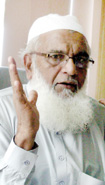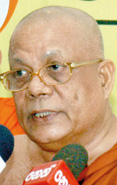News
Religious tension: Issues need to be resolved amicably through talks
View(s):= Bodu Bala Sena Organisation (BBSO) President and All Ceylon Jamiyyathhul Ulema (ACJU) General Secretary call for dialogue in interviews with Chandani Kirinde and Hansini Bandara
The recent upsurge in tension between the Sinhala and Muslim communities in the country has prompted the Government to set up an all-party Parliamentary Select Committee (PSC) to study the emerging trend in religious fundamentalism and related issues, and recommend how best to clear misunderstandings between different communities.

Moulavi M.M.A. Mubarak
The Sunday Times spoke with Ven. Kirama Wimalajothi Thera, President of the Bodu Bala Sena Organisation (BBSO) which has been in the midst of some of these controversial developments, as well as the All Ceylon Jamiyyathhul Ulema (ACJU) (Councils of Muslim Theologians General Secretary M.M.A. Mubarak, to ascertain their views on the matter: Both sides agreed that the issues at hand need to be resolved peacefully through talks. Following are extracts :
Moulavi M.M.A. Mubarak: Spread of rumours and half-truths lead to tension
What are your views on the recent rise in tension between the two communities?
These are new developments. There is more segregation among the communities these days, unlike in the past. Language is also a barrier between people, and this leads to misunderstandings. Of course, there are people spreading rumours and half-truths, and these are leading to unnecessary problems.
Who are these people?
I do not know. That is up to the authorities to find out, but the ACJU is determined to do its part to prevent any problems cropping up between the people of different religions and communities. We hold monthly meetings with members of the Jathika Hela Urumaya (JHU). We have also held meetings with several leading members of the Buddhist clergy in the country, as well as spoken to the BBSO to dispel the misunderstanding caused, especially regarding the issue of Halaal certificates. We also met with Minister Basil Rajapaksa last week, and told him to arrange a joint meeting between us and members of the Buddhist clergy. We are prepared to stop the issue of Halaal certificates, but the Minister told us we should continue with it.
There are allegations that the issue of Halaal certificates is for monetary gain?
The issue of Halaal certificates was started around 2000-2001, when a private company asked for it to export their products. Initially, it was issued free of charge, but as there was a cost incurred in the process of issuing a certificate, vis-ŕ-vis appointing supervisors, medical personnel and examiners at these places before giving clearance, it was decided to charge a fee. The annual fee ranges from Rs. 6,000 to Rs. 300,000, and the proceeds go to paying employees, as well as for welfare work. This is a voluntary system, and we have not asked anyone to get Halaal certificates. These companies want to sell their products overseas where many countries ask for this certification. By this, we are helping the export sector.
There are allegations that the Muslim community was silent on the killing of housemaid Rizana Nafeeq in Saudi Arabia?
That is not correct. When she was jailed, we were the first to write to the Saudi authorities seeking her release. We also sent two of our emissaries there to secure her release, but they refused to listen to us.
Many Muslim women are seeking employment abroad. What are your views on that?
Our position is that women, particularly Muslim women should not go abroad for employment but no one listens. Many social problems have surfaced due to women going abroad for employment. There are more divorce cases and many families are suffering.
There are fears that the Muslims want Sharia law in Sri Lanka as well?
We don’t need Sharia Law in Sri Lanka. We go by the existing a law in the country. We want to live together in peace.
There is a perception among non-Muslims, of a move towards radicalisation among the Muslims in Sri Lanka. For example, the women are attired in a more conservative manner than some years back?
The manner women choose to dress is their choice. Some women travel to Middle Eastern countries and learn to dress in this manner. They decide what to wear and there are no rules set by us. There is an increase in the number of people who go to mosques that I can say. But they go there to pray, and not to prepare for Jihad, as some people fear. There was a report of a new mosque being built in Mullaitivu. A mosque built there during the time of the British was destroyed in the war, and is now being rebuilt, as people return to their old homes.
Ven. Kirama Wimalajothi Thera: Our fight is not with the traditional Muslims
What was the main objective behind setting up the BBSO?

Ven. Kirama Wimalajothi Thera
It was formed mainly to fill the need for a proper leadership for Buddhists within the country. There is no institution established to address issues faced by Buddhists. We are not funded by the Government, our organisation runs solely on donations made by members and Buddhists. We have been carrying out our service towards preserving Buddhism within the country, and the construction of the Buddha Jayanthi Mandiraya is also a part of it. We even initiated printing Buddhist texts. People are aware of our services towards the country.
The BBSO has alleged that certain groups are spreading extreme Muslim ideologies in the country?
There are around eight groups in the country spreading Muslim fundamentalism. We have evidence to support what we say. These groups are gradually trying to take over the Eastern Province. A Sinhala person can’t go and buy a plot of land from that area, but Muslims can. They‘ve started destroying Buddhist stupas in the Province. We have been raising our voices against these activities, and took measures to bring these issues to the attention of authorities, including the Ministry of Buddha Sasana and Religious Affairs and the Department of Archeology. We do not intend to promote racism
We want to protect Sinhala Buddhists and the Buddhist culture. I would like to emphasise that our fight is not with the traditional Muslims who have been living in the country for generations. We have received information that there are armed groups who have been trained in Saudi Arabia, and are currently operating here. Sharia law has started to come into implementation in some areas in the Eastern province. We are making these accusations on the basis of evidence to prove them. We have already given this information to the authorities.
How do you propose to protect the Buddhist community in the country, while fighting against voices promoting religious extremism?
We will only resort to nonviolent methods to carry out our campaign. We are creating awareness at village level about our work.
There were campaigns by groups for the boycott of Muslim-owned businesses. What are your views on this?
The BBSO firmly condemns the adoption of such violent methods against people of other religions. Similar anti-religious campaigns are being conducted through social media as well, but the BBSO has never been a part of such campaigns. We do not accept and we will never adopt such methods to carry out our campaign.
A BBSO member has said to allow polygamy for the Sinhalese as well. What is your comment?
We do not share the view that it should be allowed for the Sinhalese as well, but the law must be equal for all communities in a democratic country. Why allow polygamy for one community? Such practices should not be adopted?”
Have you held talks with members of the Muslim clergy on these issues, in order to resolve them amicably?
Over 200 Muslims have visited the Buddhist Cultural Centre for discussions and they too shared the view that those who promote and spread religious extremism are a threat to the peace and sustainability of the country.
You met with President Mahinda Rajapaksa recently. What was the outcome?
We received a favourable response to our queries from the President. We apprised him of the concerns of the Buddhists in this country, and he called the respective authorities and instructed them to take action to resolve these issues. We made it clear to him that the BBSO is not a political organisation and that we do not aim to topple the Government.
Follow @timesonlinelk
comments powered by Disqus
















